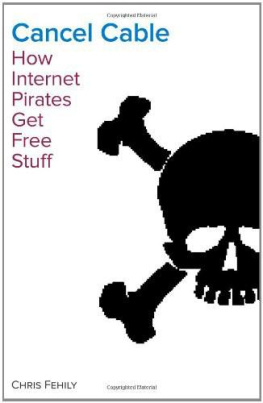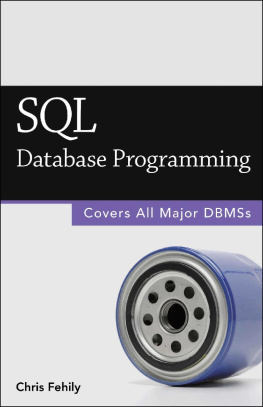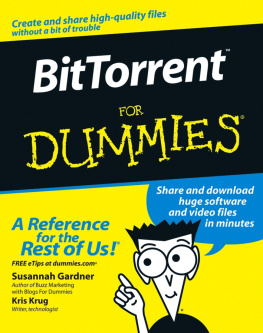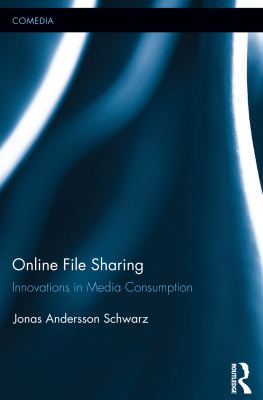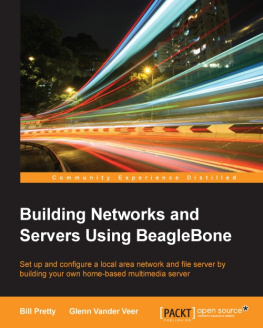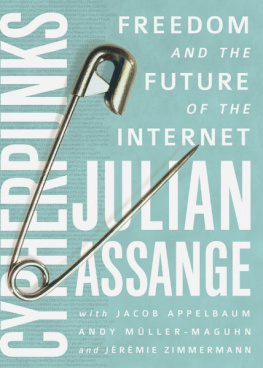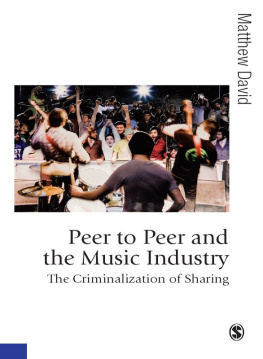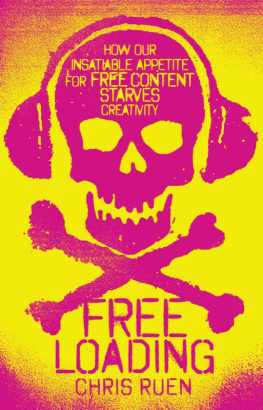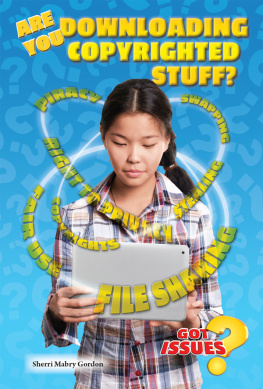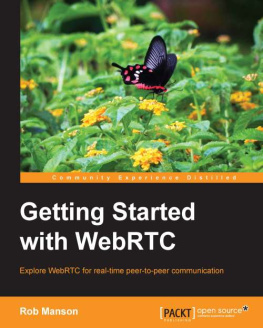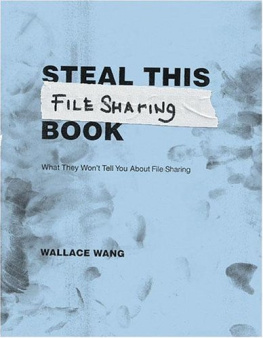Cancel Cable: How Internet Pirates Get Free Stuff
by Chris Fehily
Copyright 2011 by Questing Vole Press. All rights reserved.
For Bo
Chapter 1 The Terrain
Free for the taking: an internet bounty of shared movies, TV shows, music, video games, fonts, books, software, photos, and anything that can be digitized and copied. Whats the catch?
Lawyers
Depending on where you live and what you share, file sharing might be unlawful. Only in the United States are these laws enforced with any vigor. (Most of whats shared is produced in the US, and protecting American intellectual property isnt a concern for other nations.) Under US law, the crime is copyright infringement, a term so fatiguing that interest groups rechristened it piracy. Infringement leaves the original work intact and isnt piracy (or theft) in the common sense, but thats what happens when your opponent controls the language of the debate. The enforcement and awareness campaigns of copyright holders have been so grasping and ham-handed, however, that ordinary people now call themselves pirates, either matter-of-factly or defiantly.
My own Damascus Road came while watching a Hollywood propagandette featuring a backstage nobody griping about movie pirates picking his pockets. Considering the enormous money and influence at play put me in mind of the banker who enjoys an $800 lunch at Masa before dashing off a note to a finance minister about the austerity program.
File-sharing news at TorrentFreak reports the regular failures of copyright holders and their enforcers. They pushed through their own laws by using the usual methods but then got lazy, unwisely listening to litigators rather than public-relations consultants, who would have counseled them to:
- Censor the internet via political pressure on weak internet service providers.
- Hire a PR flack to design a campaign to convince the bewildered herd that file sharing is a threat to their entitlements.
- Apply power from the top and protect it from the bottom. Convince cops that intellectual property is real property. Cops, paid with property taxes, are more vigilant about property-related crimes than violent ones.
If you live in the United States, read this book as you would one about evading taxes or creating home meth labs. Elsewhere, officials enforce intellectual-property laws mincingly, prosecuting people they dislike or tossing the odd pirate to a US trading partner or domestic front group.
Victims
The US, the UK, France, and a few other late-stage mercantilists have piracy laws with nontrivial punishments. Though these laws are mostly unenforced (its career and spiritual death for public prosecutors), private lawyers still love them.
In the US, for example, entrepreneurial lawyers buddy up with producers of low-grossing movies, threaten downloaders en masse, and then split the settlements. Threaten not summon, and settlements not awards. These suits arent intended to go to court. The targets are told to pay up or be sued for serious cash. The sweet spot appears to be a $1500$2500 settlement, an amount that most people, guilty or not, will pay to make a lawyer go away. Ensnared pirates who pay the settlement still dont do badly; after all, theyve saved a mountain of cash over the years by not paying for stuff theyve downloaded. UK lawyers run a similar racket. Its a growth industry.
As a scare tactic, US industry groups (usually the MPAA and RIAA) sometimes sue people and pirate websites in court. Court-imposed fines are huge, though these crimes should be on par with shoplifting.
Q&A
Q: The worlds full of lawyers who dispense injustice. So what?
A: No real effort is made to establish guilt. The technology that fingers downloaders is flawed and casts a wide net. Corpses and network printers have been threatened.
Q: Collateral damage aside, didnt these pirates get what was coming?
A: Startup idea: License or create copyrighted material. Dangle it on pirate sites and sue Americans who bite. Profit!
Q: Wont encouraging piracy drum up business for these lawyers?
A: Most books have no measurable effect, and piracy is legal or near riskless for most of humanity.
Q: Dont artists have the right to make a living from their work?
A: Its a desire, not a right.
Q: And small businesses?
A: New sellers of knitting patterns, fonts, comic books, guitar lessons, and fashion designs learn that such things have long been shared online. To be surprised or embittered invites more schadenfreude than sympathy.
Q: And you?
A: This book is headed for pirate sites with or without my consent. Even if I sell it in only paperback format, someone will photocopy it and post it online, or someone at the printer will swipe the PDF and post it. Or, some book reviewers kid will do it. But they wont have to because I am going to post it, heading off low-quality or expurgated copies. If pirates hurt sales of the for-pay versions, Ill find another way to make money. Musicians give concerts. Artists get patrons. Writers speak.
Q: Ive read about people getting busted for piracy and paying huge fines isnt file-sharing riskier than you imply?
A: Youve also read about fraud busts at tax time and drug busts before elections. News is by definition the reporting of rare events. When trivial or commonplace events are treated as news, ask yourself, Why now? and Who benefits? Most drugs-in-our-schools stories, for example, are scripted in the studio. A reporter and cameraman, rather than wander the halls until Judgment looking for an actual dealer, find a kid wholl agree, Sure, Ill say I sell drugs in school on camera. With few exceptions, laws are written to advantage their writers. Interested parties, not legislators, draft copyright laws and use the press to create the illusion of enforcement. When calculating the probability of being caught, consider in your denominator that piracy accounts for at least a quarter of worldwide internet traffic.
Q: Still, isnt piracy a bit dishonorable?
A: Honor is unimportant in my society, but my understanding is that its something earned and not tarnished except by the shame of the acquirer. Ones honor is not at the discretion of counter-pirates. Twinge of conscience? Tell yourself that you never would have bought what youre downloading for free, so the owners incur no loss. As for the goals of the creative class, fame and attractive lovers trump money.
Benefits
Heres what youre missing:
Zero cost. Everything that you download is free free free.
No shame. Ive worked in and around Silicon Valley for more than 15 years, and I have yet to meet anyone privately concerned with the legality of anything downloaded over the internet.
Fillerless. TV shows have no ads. Movies have no menus, unskippable content, autoplay ads, forced user input, or copythreats.
Minimal wait. That new episode of Doctor Who is available for download worldwide minutes after it airs on the BBC. Unedited Olympic, World Cup, NFL, and other sports events are posted right after the final whistle (no TV time-shifting).
No DRM. Digital rights management (DRM) is broken or bypassed in pirate downloads. DRM prevents you from watching, playing, hearing, reading, opening, or copying something whenever and wherever you want. Retail DVDs, for example, are region-coded to play only in specific parts of the world. Retail music, games, ebooks, and software often have DRM restrictions too. (DRM isnt about impeding pirates but repeatedly selling ordinary customers the same content in different formats.)
Opt out. Every act of piracy nibbles at the world of enforcers, patent trolls, ad agencies, techno-optimists, free-marketeers, agents, graphic designers, and flag wavers.
Positive liberty. Pirates actions embody the system that they want to create: self-organization, mutual aid, direct action, autonomy, voluntary association, opposition to power, exposure and subversion of coercive institutions, and means consonant with ends.
Next page
